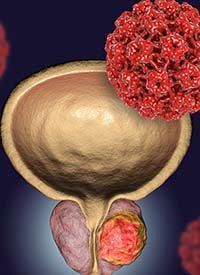Article
Darolutamide Delays Time to Deterioration in HRQoL Related to Urinary and Bowel Symptoms in nmCRPC
Author(s):
Darolutamide was linked with a reduction in locally invasive procedures, delayed time to deterioration in health-related quality of life related to urinary and bowel symptoms in patients with nonmetastatic castration-resistant prostate cancer.

Darolutamide (Nubeqa) was linked with a reduction in locally invasive procedures, delayed time to deterioration in health-related quality of life (HRQoL) related to urinary and bowel symptoms in patients with nonmetastatic castration-resistant prostate cancer (nmCRPC), according to data from an analysis presented during the 2021 American Urological Association annual meeting.1
For the study, investigators evaluated the effect of darolutamide on local symptom control. Specifically, they examined incidence and time to first prostate cancer-related invasive procedures, time to deterioration in health-related quality of life measures, and incidence of urinary and bowel treatment-related adverse events and their correlation with PSA decline from baseline to week 16 in patients receiving darolutamide.
Time to deterioration in HRQOL measures was assessed using the European Organisation for Research and Treatment of Cancer (EORTC) Quality of Life Questionnaire Prostate Cancer Module and the Functional Assessment of Cancer Therapy-Prostate (FACT-P) prostate cancer subscale.
In assessing incidence and time to first locally invasive procedures, “The results of these analyses showed that fewer patients receiving darolutamide, 4.7%, underwent locally invasive procedures, compared with patients receiving placebo, 9.6%,” said first author Neal D. Shore, MD, FACS, director of Carolina Urologic Research Center in Myrtle Beach, South Carolina. The most common procedures included catheterization, transurethral resection of the prostate, nephrostomy, and surgical excisions and resections.
Darolutamide also significantly prolonged the time to first prostate cancer-related locally invasive procedure compared with placebo (hazard ratio [HR], 0.42; 95% CI, 0.28-0.62).
“For the EORTC urinary symptom subscale, darolutamide significantly delayed the time to deterioration in quality of life for total urinary symptoms and for each individual question about urinary symptoms versus placebo,” Shore said.
The 4 questions that contributed the most to the delay in time to deterioration of HRQOL with darolutamide were:
- urinate frequently during the day (HR, 0.764; 95% CI, 0.648-0.902)
- urinate frequently at night (HR, 0.664; 95% CI, 0.559-0.790)
- pain when urinating (HR, 0.569; 95% CI, 0.441-0.734)
- urinary problems interfere with daily activities (HR, 0.748; 95% CI, 0.614-0.910)
Darolutamide was also found to significantly delay the time to deterioration of total bowel symptoms vs placebo (HR, 0.781; 95% CI, 0.664-0.918).
“For each of the 4 bowel symptom-related questions, darolutamide delayed the time to deterioration versus placebo with hazard ratios ranging from 0.87 to 0.91, but 95% confidence intervals were wide and crossed 1,” Shore said.
Regarding the FACT-P Prostate Cancer Subscale, darolutamide significantly delayed time to deterioration for total urinary symptoms as well as for each of the 3 urinary symptom questions. The time to deterioration in trouble moving bowels was not significantly affected by treatment with darolutamide, however (HR, 1.089; 95% CI, 0.0862-1.376).
In the overall study population, urinary retention occurred in 36 patients (3.8%) in the treatment arm vs 41 patients (7.4%) in the placebo arm. Dysuria occurred in 25 patients (2.6%) in the treatment arm vs 29 patients (5.2%) in the placebo arm.
“The incidences of other urinary and bowel adverse events showed minimal differences of 2% or less between treatments,” Shore said.
In addition, for patients treated with darolutamide, greater prostate-specific antigen response was associated with a lower incidence of urinary retention and dysuria.
Specifically, patients receiving darolutamide who had a PSA decline of 90% or greater from baseline to week 16 had incidences of urinary retention and dysuria of 2.2% and 0.5% respectively compared with 5.1% for urinary retention and dysuria in patients with a PSA response of less than 50%.
“In conclusion, darolutamide was associated with a reduction in locally invasive procedures and delayed time to deterioration in patient health-related quality of life with respect to urinary and bowel symptoms. No increase in urinary and bowel-related adverse events compared with placebo confirms the favorable safety profile of darolutamide. These findings demonstrate that darolutamide had a positive effect on local disease recurrence and symptom control in patients with nonmetastatic CRPC,” Shore said.
Reference
- Shore S, Stenzl A, Pieczonka C, et al. Impact of darolutamide on local symptoms in patients with nonmetastatic castration-resistant prostate cancer. Paper presented at the 2021 American Urological Association Annual Meeting; September 10-13; virtual. Abstract PD34-10
Latest Conference Coverage

Zongertinib Elicits Durable Responses in Pretreated Advanced HER2-Mutant NSCLC

Lenvatinib Shows Efficacy in Advanced HCC Post-Progression on Atezolizumab/Bevacizumab

Sacituzumab Govitecan Does Not Significantly Improve OS in Pretreated Urothelial Carcinoma

Active Monitoring Is Noninferior to Guideline Concordant Care in Low-Risk DCIS
2 Commerce Drive
Cranbury, NJ 08512





